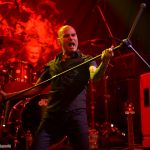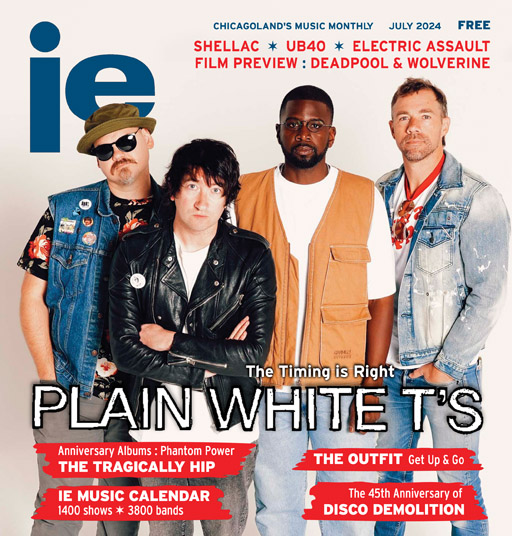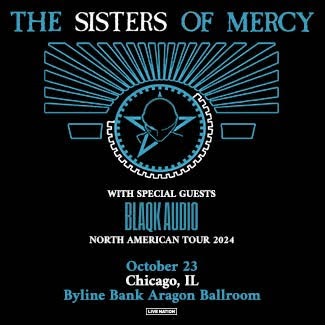Hello My Name Is…Steve Harris from Iron Maiden and British Lion [with Photo Gallery from The Forge of Joliet]
Liam Gallagher always said that there are only two ways for an English lad to break free from his grey, oppressive, working-class environment — become a professional footballer or start a rock and roll band. Growing up in the London suburb of Leytonstone, Iron Maiden bassist Steve Harris clearly remembers doing both. Quite well, in fact, and consequently being torn by his love of the twin pursuits.
“Football was a big part of my life in the teenage years,” says the musician, 64, who nearly signed with West Ham United. “But music grabbed me even before that — I remember listening to stuff as a kid, and I remember the first single my parents ever bought me when I was five years old. But then I got into football, and only started to take music seriously when I was 16 — I started listening to rock and prog-type stuff, and I actually thought, ‘I’d really like to have a go at this myself and try to play music.’ And that was it, really.”
Now, the man is so accustomed to staying busy that he’s formed a spinoff outfit during Maiden’s downtime, British Lion, which just issued its sophomore set The Burning, which features the more straightforward, bluesy vocals of Richard Taylor, and the classic-metal guitar stylings of Grahame Leslie, whom he first managed — and composed with — in the early ‘90s. He reassembled them for his first 2012 solo album, British Lion, then rechristened a fleshed-out lineup under that moniker, as well.
But he never gave up on sports completely — he still plays for fun with his amateur team, The Maidonians. “I’ve known a lot of the guys from years ago when we were all in proper leagues,” he explains. “But when I’m on tour with Maiden, I find it difficult to get players, so some of the crew will play and on the last couple of tours with my son’s band (The Raven Age), my son and some of the members would play.” But Harris is happy that rock won out over soccer, he adds. “Because I’m still doing music, and if I’d chosen football, I’d probably be into management by now!”
IE: Countless young musicians have probably handed you their demos over the years. What caught your ear about these guys?
STEVE HARRIS: Yeah — people come up to you all the time and give you stuff, but with Grahame, it was different because his stuff was really, really good. It was just top-drawer stuff. It wasn’t stuff that we ended up using later — it was a different band he was in, and a different singer at the time. But the quality of what he was doing was good. And then he got together with Richard Taylor, and it went from there. And obviously I got on board, but when it fell apart, I thought, “One day I’ve got to make sure that this material sees the light of day.” So that’s what I told Richie, and that’s what I did. And they actually let me be IN the band, so I’m loving it, I’m really enjoying it.
IE: Did you sit them down and say, “Now, listen, guys — first we have to come up with a really cool logo”?
SH: Exactly. The name was from back in the day, anyway, and it was a name I came up with. They weren’t really sure of the name to start with; it was a little bit hard-edged at the time. But I was pushing them in that direction anyway, with a bit more UFO and Thin Lizzy kind of stuff. But that’s what it ended up being. So yeah — good name, good artwork. It’s very important to get these things across. Obviously, the bottom line is, you’ve got to have really good songs and good playing. But if you’ve got really good artwork and imagery, then it really goes a long way. It makes a massive difference. With Maiden, people were buying the first album without knowing anything about it — just what they saw on the cover.
IE: How weird is it to be back playing clubs?
SH: Well, it’s not weird at all — it just feels great. It feels natural to me. I love playing gigs anyway. I’ll get up and play gigs anytime, anywhere — I don’t really mind where they are. But I actually like playing smaller places, and now I’m getting to play them all, and not many people have had that chance. And lots of these clubs Maiden didn’t even playback in the day, so I’m getting the chance to do them now.
IE: People forget how influential Maiden, Saxon, and maybe even Krokus were back in the late ‘70s when metal started speeding up. It was like you took your cues from punk rock.
SH: Well, we didn’t really. I can’t speak for the others, but I wasn’t into punk at all. In fact, if anything, I really couldn’t stand punk, and it really used to piss us off because they were basically taking our gigs away. So we weren’t very happy with them at all. But having said that, yeah, back in those days, it was pretty amazing, what was going on. And being in British Lion brings back a lot of those memories of struggling, trying to make it, where every gig you play in a club is just fighting for recognition or for people to like us. It brings back a lot of those memories for me, so I like that side of it, as well.
IE: Lyrically, The Burning touches on a lot of interesting subjects, like faith, what’s gone wrong with society, and mankind’s inevitable extinction.
SH: Well, it’s obviously relevant to a lot of things going on today. But Richie writes a lot of the words, and they’re perhaps slightly more personal than what I would write. I do write personal stuff, but I tend to disguise it. He wears his heart on his sleeve a bit more. But yeah — there are lots of different topics going on, and I think you can’t help but be affected by what’s going on around you.
IE: You listen to “Land Of The Perfect People,” and lines like “Just a young boy all alone,” and it sounds like an orphan’s viewpoint.
SH: Well, it was. That’s exactly what he was. And the Taylor family are the people who used to run the orphanage, and when they left the place and disbanded the orphanage, they adopted him. So that’s really quite literally what it’s about.
IE: One of my favorite movies is Peter Greenaway’s The Draughtsman’s Contract. And you were actually an architectural draughtsman, too. Did that ever come into play in your later life?
SH: Yeah. Obviously, back in the day, I used to do a lot of private work and whatever. But it’s come into play now because I am interested in building stuff, and renovating. So it’s come in handy for all that sort of stuff because I can’t have people pulling the wool over my eyes when they’re giving me estimates, because I come from that background. I don’t know all that there is to know about building, but I do know a fair bit.
IE: How proud are you as a dad just to have your two oldest kids, Lauren and George, involved in the biz?
SH: It’s amazing, just fantastic to see them out there and enjoying what they’re doing. And George, now, for example — I went back a week early just before Christmas, just so I could see his headline show in London with Raven Age, and I was able to cram in a few gigs with British Lion, as well. So it’s great. He’s doing great, and Lauren did really well too. She’s still got an album’s worth of stuff that I think needs to see the light of day, so we’ll see what happens.
IE: What lessons do you live by now?
SH If you’re talking about actual playing, I just think that you shouldn’t practice too much. Some people practice for hours and hours each day, but you’ve just got to play when you feel like playing. That’s all I would say. Just enjoy it — don’t get taught to play in a regimented way. You’ve got to be playing something you like. And on a higher level. In my life, I’m a realist. I think things are the way they are, and you’ve just got to get on with it. Whatever gets thrown at you? You deal with it. The way we were brought up in Britain back in the day was just basically to do exactly that — anything happens, pick yourself up, brush yourself off, and get on with it.
British Lion performed at The Forge in Joliet on 1/29. Ed Spinelli’s gallery is below
-Tom Lanham
Category: Features, IE Photo Gallery



































